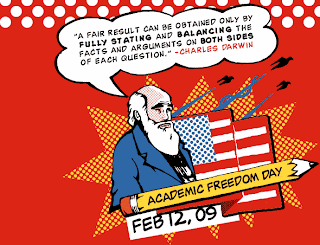 My friend Forrest Mims, survivor of Darwinist thug attacks, has recently been named one of the “50 best brains in science” by Discover Magazine (December 2008, page 43). The cover story informs us, “there may be no amateur scientists more prolific than Forrest Mims.” It is not on line yet.
My friend Forrest Mims, survivor of Darwinist thug attacks, has recently been named one of the “50 best brains in science” by Discover Magazine (December 2008, page 43). The cover story informs us, “there may be no amateur scientists more prolific than Forrest Mims.” It is not on line yet.
The Discover article classes Mims as an Outsider and reads, in part, “There may be no amateur scientist more prolific than Forrest M. Mims III, 64, of south central Texas. He has published in major scientific journals such as Nature as well as countless general-interest publications. Mims began teaching himself science and electronics at age 11 and says he never received any formal training apart from a few introductory college courses in biology and chemistry.” I am told the list includes some other relative unknowns, as well as Bill Gates, Stephen Hawking (on the cover), Michael Griffin (head of NASA), James Hansen (global warming guru), E. O. Wilson (sociobiologist and evolutionist), Larry Page and Sergey Brin (Google founders), Neil deGrasse Tyson (PBS Nova), Harold Varmus (NIH), and J. Craig Ventner (human genome).
The selection panel has good reason for its view of Forrest. For a man with little formal science training, Mims has done an astonishing amount of research that has been published in a variety of journals. He has written many popular articles, as well as books. He is probably best known for the books and lab kits on electronics projects that he had developed for Radio Shack over the years. He even has a claim to minor historical fame as a co-founder of MITS, Inc., which introduced the Altair 8800, the first microcomputer, in 1975.
Encouraged by her family, his daughter Sarah Mims had a journal publication while still a high school student.
However, Forrest told me yesterday that when he was first told by a Discover editor to expect his name to come up, he worried that it was a vulgar hit piece, retailing the “Scientific American” affair or the “Eric Pianka” episode. Read More ›
